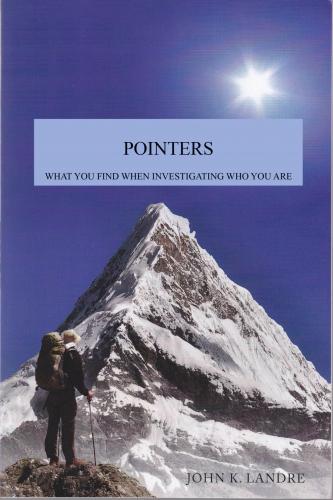Pointers. John K. Landre
POINTERS
WHAT YOU FIND WHEN INVESTIGATING WHO YOU ARE
John K. Landré
Copyright 2017 John K. Landre
All rights reserved
Published in eBook format by eBookIt.com
ISBN-13: 978-1-4566-2815-4
No part of this book may be reproduced in any form or by any electronic or mechanical means including information storage and retrieval systems, without permission in writing from the author. The only exception is by a reviewer, who may quote short excerpts in a review.
Alles Vergängliche
ist nur ein Gleichnis;
das Unzulängliche,
hier wird’s Ereignis;
das Unbeschreibliche,
hier ist es getan;
das Ewigweibliche
zieht uns hinan.
Goethe
Everything transitory
is only a metaphor;
the deficient
here becomes the attained;
the indescribable
is here accomplished;
the eternal feminine
draws us up.
(My translation)
ACKNOWLEDGMENT
Thank you, Drizz, for bearing with me.
PREAMBLE
This publication consists of a series of short notes I previously posted on Facebook. It follows my earlier book “On the Way: Growth and Transcendence of Personal Consciousness”. On the Way describes the stages of mental development we grow through during our lives, whereas this work focuses more on the insights we acquire toward the end of life.
Let me first briefly repeat what On the Way was about. During our lives personal consciousness slowly grows through five distinct phases, each next one including and transcending the previous ones.
| Phase of consciousness | I. Security | II. Social |
| Most trusted input | Instincts | Emotions |
| Category of needs | Survival | Belonging/Duty |
| Worldview | I cope in a hostile world | I belong to a problem world |
| Main preoccupation | Am I safe? | Is the world as it should be? |
| Major skill development | Instrumental | Interpersonal |
| III. Rational | IV. Mystic | V. Enlightenment |
| Factual observations | Intuition | Witness consciousness |
| Self-esteem | Compassion | Egoless: no needs |
| I participate in a world project | I am part of a larger whole | I Am |
| Am I as I should be? | Spiritual seeking | No inquiry: here-and-now awareness only |
| Mental/Creative | Contemplative | N/A |
In the first, instinctual phase we focus on safety. Getting control over our environment is the main goal. Our most important relationship is with things, rather than with other people. We identify with our instincts and we develop instrumental skills.
Rather than with our instincts, in the second, emotional phase we identify with our feelings. We develop interpersonal skills and focus on fulfilling social needs: belonging to the community and doing our duty. Looking good in the eyes of significant others is the main motivator. In the emotional phase the most important relationships are not with things, as in the instinctual phase, but with other people.
In the third, rational phase we identify with our mind and we develop self-esteem. We work on becoming acceptable in our own eyes and focus on defining our mission in life. Our primary relationship is with ourselves and we develop creative and system skills.
In the intuitive, fourth phase of consciousness we become spiritual seekers. Here our main focus is on the area of consciousness that lies beyond the mind. Identification is with our intuition. The predominant relationship is no longer with things, other people, or ourselves, but with a power we imagine to be larger than ourselves. We develop contemplative skills.
Consciousness in the fourth, intuitive phase has three aspects. We first identify with a Silent Witness of our thoughts and actions. Later we may enter what is known as Peace consciousness. Here the ego disappears from awareness and we identify with the totality of phenomenal manifestation. At the third aspect of intuitive consciousness the separation between self and the Divine disappears and only pure Subjectivity remains.
A few, fortunate individuals reach a fifth, Non-dual phase of consciousness. Here all differentiation vanishes and identification is with the field that consciousness exists in. This phase of consciousness is known as “Enlightenment” or “the ultimate Understanding”.
In reading what follows you may get the impression that I am a religious preacher. But I am not. On the contrary. Preachers tell you what you should believe. Yet you may not want to believe what others tell you. Instead you could have a desire to investigate for yourself. What I am doing in these notes is pointing to what you will find when looking into the question of who you are.
The first few notes are short repeats of what has been dealt with in more detail in On the Way. All others are about the last phases of consciousness. For a detailed description of how we grow through the first few phases of consciousness, see On the Way: Growth and Transcendence of Personal Consciousness.
CONTENT AND CONTEXT
This series of notes is about the context of life. It is not about what we think and do but about why we think and do what we think and do. What we think and do is the content of our lives. But behind that is the context, the why. It is through our thoughts and actions that we raise our level of consciousness.
DO FIVE PHASES OF CONSCIOUSNESS REALLY EXIST?
Suppose you are a person in the second, emotional phase of consciousness. For you the first, instinctual phase of consciousness is real: you have been there. So is the emotional phase: you are there. But all higher phases of consciousness are unreal, do not exist, and are unimaginable, because you have not yet experienced them. To you talking about them makes no sense.
Let’s look at an example, the statement that the free market system is superior to socialism. This is a statement a person in the third, rational phase of consciousness may make. To someone in the second phase of consciousness such a statement is emotionally unacceptable and
